The Descendants: Growing up Marley on the football field, Jamaican hillside

This story appears in the September 15, 2014, issue of Sports Illustrated. Subscribe to the magazine here.
“Not one of my seeds shall sit in the sidewalk and beg your bread.” -- Bob Marley, “So Jah Seh,” 1974
You’ll have as much luck finding a cellphone signal at the Marley Coffee plantation, draped on a remote mountainside in Portland Parish, as you will finding Wi-Fi, which is as much luck as you’d have had finding any kind of telephone here in the 1940s, when one of the 20th century’s most influential musicians was born the next parish over. The narrow dirt road to this property in northeastern Jamaica is flanked by vegetation of so many shades of green that the eye’s rods and cones strain to distinguish them. Former All–Big East linebacker Rohan Marley, 42, is watering the smallest and most fragile of these green things: one-inch coffee seedlings planted under a cloth canopy. His unlearned hand strafes the earth beneath the plants, until his head farmer, who is known as Painter -- a grinning ebony-skinned man in his 50s -- gently takes the can and flicks it back and forth at head height, sprinkling the seedlings as gently as rain.
One day Marley would like to pass along his rapidly growing international coffee business to his eldest son, Nico, 19, a sophomore linebacker and business major at Tulane who is standing nearby. Nico and the rest of the group stand with one knee bent at a right angle on the farm’s unyielding 45-degree slope, pocked by the deep crags and moss-covered minisummits that make Blue Mountain beans among the most flavorful in the world. Nico’s deep voice, bearing the famous rasp of his grandfather, Bob Marley, is barely audible over the rumble of an unseen water-fall. He says he’d be “humbled” if the Marley Coffee enterprise were offered to him, “but I’ve got other plans.”
“This is hallowed ground, seen?” says a barefoot Rastafarian elder named Brenton in the local dialect, the gaps from his lost teeth making those three s’s whistle. And it’s true: Hundreds of years earlier, runaway slaves hid on the fertile soil being imprinted by Nico’s muddy Jordans. Or as Brenton puts it, in five more whistles, “Slaves dem escape from plantation near town and run to the mountains to get dem liberation.” These hills are also where Rohan, considered the most restless and reckless of Bob Marley’s 11 known children -- the “bad son” who at 12 was sent to live with his dad’s mother in Miami, where he found an outlet for his aggression in –football -- discovered a new sense of purpose. His second outlet.
Neither Rohan nor his Grammy-winning brothers Ziggy, -Stephen and Damian (16 statuettes among them) nor Bob Marley’s four other sons are likely to admit it, but it’s not easy being the great reggae singer’s child. Their father, who died of melanoma in 1981 at 36, is one of the few men whose faces are as recognizable in Tokyo as in Timbuktu or Reykjavík. He’s also an international symbol of freedom, human rights and self-determination.
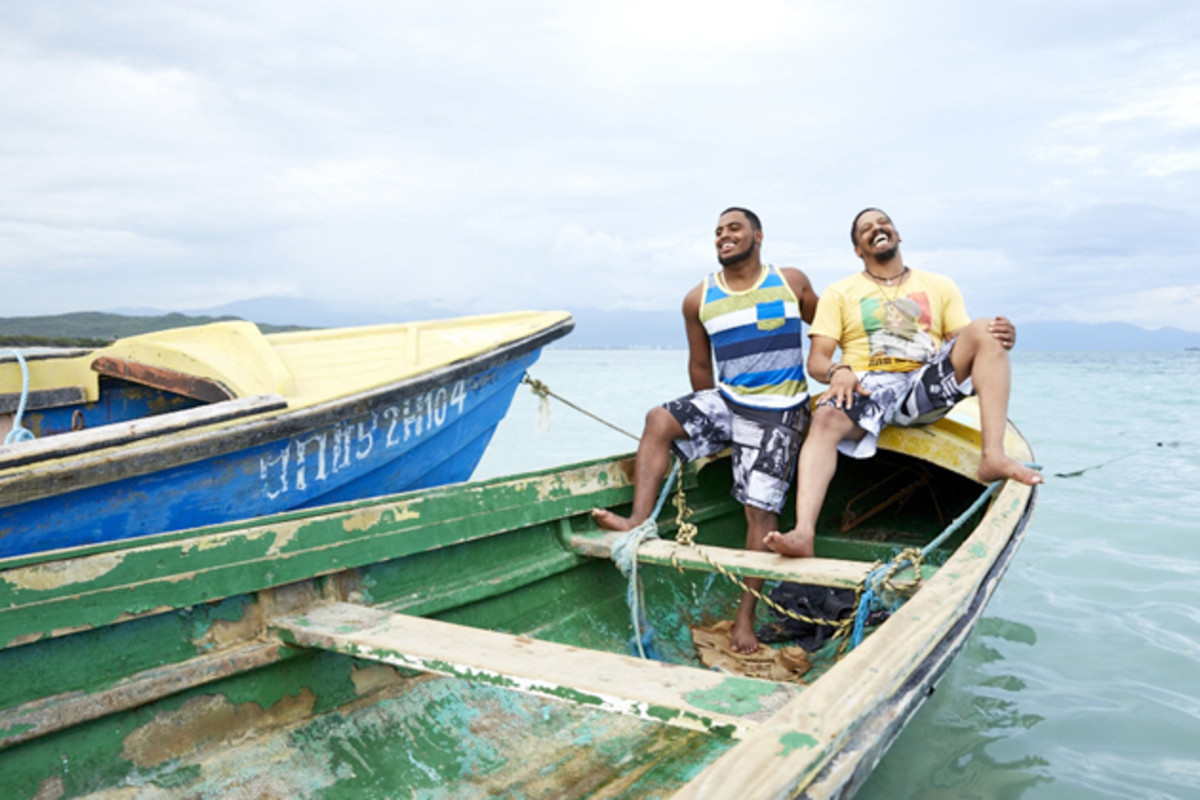
Oh, being Bob Marley’s son can be fun when you’re young and playing football at Miami, but as your 30s creep closer and you haven’t done much else, you can become known as what Jamaicans call a licky-licky -- a freeloader. Since he was 18, Rohan has known that the Marley money is his safety net and, in ways, his burden. It can make it hard to be a dad, because lessons about work ethic and education are not easy to impart when you don’t have a degree and -- aside from a partial season in the CFL -- you’ve never been, you know, employed.
In 1999, five years after his Hurricanes career ended, Rohan was living in New York City with R&B star Lauryn Hill. He was working security for his brothers during their concert tour when he received a windfall from his father’s estate in the low six figures, the kind of good fortune that befalls Marley’s offspring less often than you might think for an artist whose Legend album still ranks in the Billboard top 100 30 years after its release. At the time, Rohan had four children aged five or younger: two with Hill (they would have three more together) and two with his ex-wife, Geraldine Khawly, whom he met when they were students at Miami’s Palmetto High. With his kids in mind, Rohan decided to invest in something that, if it couldn’t be as magical as his dad’s music, might at least have its staying power.
During a hike that year with some trusted Rasta brethren in a barely accessible stretch of mountainside in Portland Parish, Rohan found that something. “Trees dropped star apples at my feet,” he recalls. “An old house appeared out of the mist. You could hear a river rumblin’ but you could nah see it. I was like, Was there a farm here at some point?” It looked as if no one had been there in 200 years. “Seeing what I was seeing, hearing the river, I thought it was a dream,” Marley says. The dream stretched for 52 acres. “This coffee country,” one of his companions said matter-of-factly.
That land is not only a farm once again, but it is also the hub of a $5.6 million–per–year business (“sustainably grown, ethically farmed and artisan -- roasted-gourmet coffee,” according to marleycoffee.com) that harvests its beans in Jamaica, Ethiopia, Guatemala and Papua New Guinea and sells them in retail outlets as far-flung as Chile, Germany and Japan. Sales are so robust that Rohan’s cousin Warren Marley, 42, sitting on a stump puffing another indigenous crop, says that the company’s biggest challenge is “supply meeting demand."
*****
Like the college football success of his son and grandson, Bob Marley’s rise to prominence was extremely unlikely. He was a scrawny teenager from the hills, abandoned by his white dad and raised by his mom and Kingston’s streets. Rejected by Jamaican society because of his light skin and European nose, he lived through the worst kind of Third World poverty in a neighborhood called Trench Town because of its lack of plumbing. From this meager beginning, surrounded by violence and death and belly-bloating hunger, he wrote songs that reached every corner of the planet and changed it -- musically, spiritually, politically -- for the better. He helped make history as much as he witnessed it: playing amid tear gas at Zimbabwe’s independence celebration in 1980; attempting to unite the murderous political factions in Jamaica; getting shot as a result and then playing a free concert for 80,000 the next day, daring the gunmen to try again.
In 1972 one of Bob’s many mistresses, Janet Hunt, gave birth to the son who would play college football, twice competing for national titles. For a 5' 8", 200-pound player to start as a D-I linebacker was a bit of a miracle -- especially on a team such as Miami’s, which from 1992 through ’94 had seven linebackers who would later play in the NFL. And for an undersized son of this undersized Hurricane to come along 20 years later and win co–freshman of the year honors in Conference USA was just as improbable.
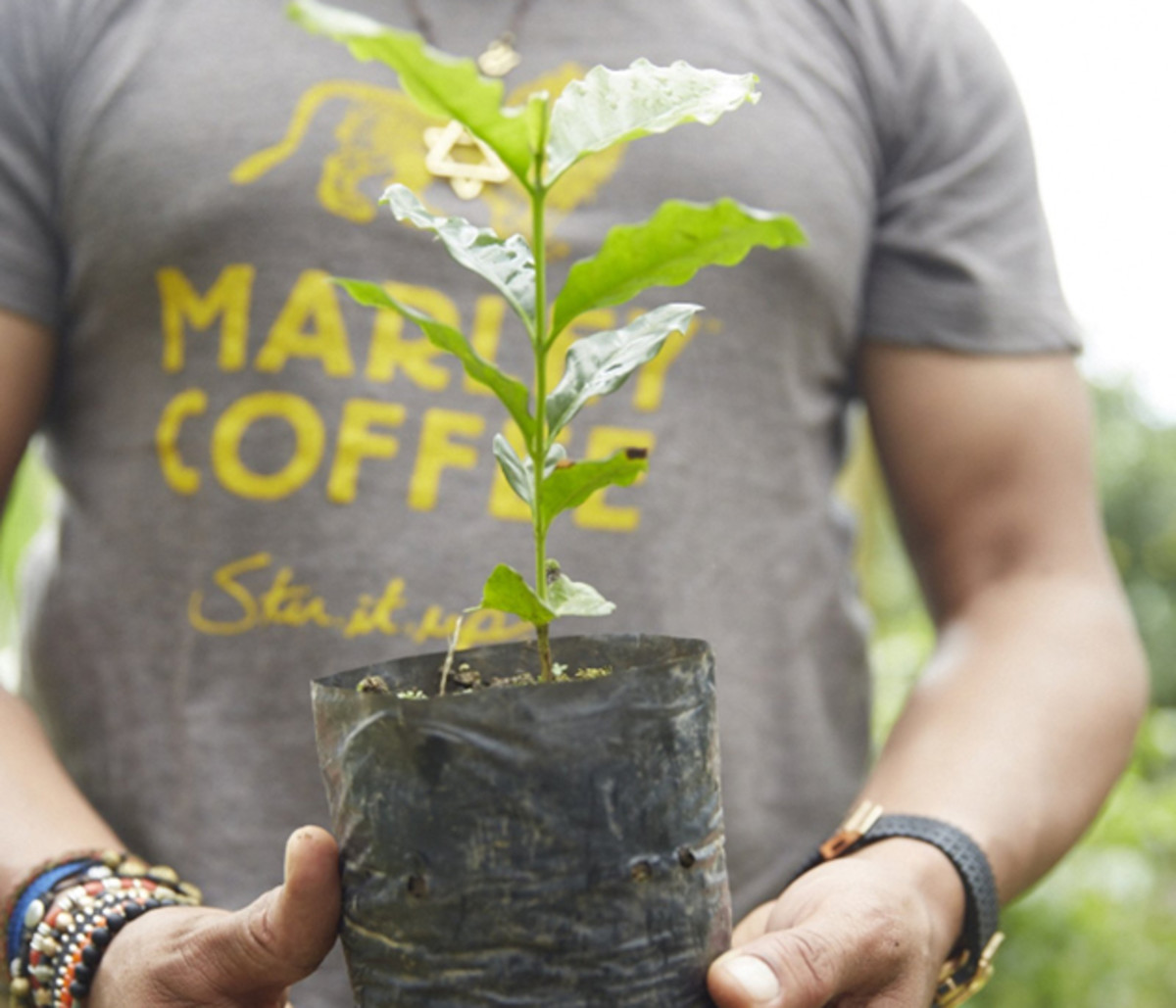
Nico was a playmaking, angle-eliminating linebacker at Cypress Bay High, a South Florida power, but he received little interest from colleges for the same reason his dad received only one D-I scholarship offer: At 5' 9" and 200 pounds he doesn’t fit the prevailing model at the position. “Watching [high school] film of Nico,” says -Tulane coach Curtis Johnson, “it was like going back in time 20 years. One of our assistants here, Keith Williams, played for me at San Diego State [from 1991 to ’93] back when we played Miami…Nico had the same fire as his dad, the jumping around, the energy. I said, ‘If this kid can play special teams the way he’s playing linebacker on this film, I’ll take him just to cover kicks and punts for us.’ ”
A good many Tulane students have assumed that Nico has a closetful of sinsemilla in his dorm room, but according to junior safety Darion Monroe, “Nico might be the most straight-laced, most depend-able guy on the team.” He is calmer and quieter than his dad, who in early middle age is a slightly thicker version of the headhunter who led the Canes in tackles in 1993, with 19 more than a freshman All-America named Ray Lewis. But Nico has the same ferocity on the field. “Our first practice [in 2013], I thought, God, he’s shorter than I thought he was,” recalls Johnson, who won a national title as a Miami assistant in the 2001 season and Super Bowl XLIV as the receivers coach for the Saints. “The first couple of days in pads, he’s out there tackling everybody, just like his dad. In my mind he was just moving up the depth chart. After our first scrimmage, there was no question. I had to start him.
“I was worried about him the first game, just the mental aspect of it, but then -- god, he was good. You would look at the stats: 10 tackles, 10 tackles. I mean, he lifted us.”
Despite erratic play from a rotation of young quarterbacks, Tulane played in a bowl game for the first time in 11 years, thanks to a defense led by a diminutive true freshman linebacker whose only other scholarship offer came from Duquesne, an FCS program. Years before he met Nico, Johnson would yelp a famous Marley lyric -- Don’t let them fool ya! -- at Hurricanes and Saints practices, a reminder of the importance of film study. And now the grandson of that singer logs countless hours in his film room, where Nico is often joined by a defensive end from Akure, -Nigeria. “Bob Marley’s music is very important throughout Africa,” Ade Aruna says. “My dad played it for us every night. He would play it again in the morning. . . . It would make us feel better.” There have been shelves of books and stacks of films about Marley, but few of them describe him as efficiently as this 20-year-old African does: “He was an activist for oppressed people but also an artist who portrayed the world for what it is. And what it can be.”
Nico heard all the stories and all the songs when he was younger, but what fueled his own success story, he says, “came from inside; it’s something I can’t even put into words, because it’s all I know. How do you describe the deepest part of yourself?” When Tulane students find out about the classmate whose granddad’s voice has rung out in college dorm rooms for the last 40 years, Nico sometimes deadpans, “Nah, you got the wrong guy.” Aruna laughs and says, “It works.” Being a Marley can be exhausting. The recurring need to create space for oneself is another family trait. It’s why some of Rohan’s smiles are forced as he crisscrosses the globe shaking hands and closing coffee distribution deals. It’s why he cut his waist-length dreadlocks a year ago. “I began to feel a bit like a mascot in some of these meetings, yuh know.”
*****
There is still a concrete soccer field at his father’s old house in -Kingston, which is now the Bob Marley Museum. Bob was always good at soccer, even back in Trench Town when the ball was wadded-up cardboard wound tight with tape. As an adult he could knee-juggle for days. He had a deceptive crossover step and surprising acceleration, and he could rocket shots with either foot. He tore the nail off the big toe on his right foot while playing in Paris in 1977, an injury that first revealed the melanoma that would take his life four years later, the week before Rohan turned nine.
The pitch is smaller than it was in the 1970s, and it’s been moved to the back of the house, to a shaded oasis where only family, friends and the ever-present Rasta brethren are granted entry. This is where Rohan is found dribbling alone one morning, on nubby asphalt cracked by thick subterranean tree roots. He is talking about his high school sweetheart, Khawly, and their son who was born four days after his last game as a Hurricane, a loss to top-ranked Nebraska in the ’95 Orange Bowl. “I didn’t know how to be a father,” he says with a relaxed smile, as if he’s relieved to confess this vulnerability out loud. “She raised him. This story is about her too. Any compliments Nico might get, she deserves most of the praise.” Nico’s dark skin comes from his mother. So do his manners, his humility. “I dinna have that when I was his age,” Rohan admits.
He talks about his own boyhood in a rough part of Kingston called Spanish Town -- where he got into rock fights and sometimes scrounged for empty bottles so he could buy lunch -- until his sons arrive with their friends. And now a different kind of football is being tossed around. Rohan’s 17-year-old son Zion (khaki skin, one-inch Afro) looks like the teenage Bob pictured on his first crackly records. Twelve-year-old Joshua is a wiry lefthanded quarterback with the distinctive, wide-set eyes of his mom, Hill. Laughing Rasta elders, their gray ropes of hair dangling behind them, try their hand at throwing the football, its seams wobbling.
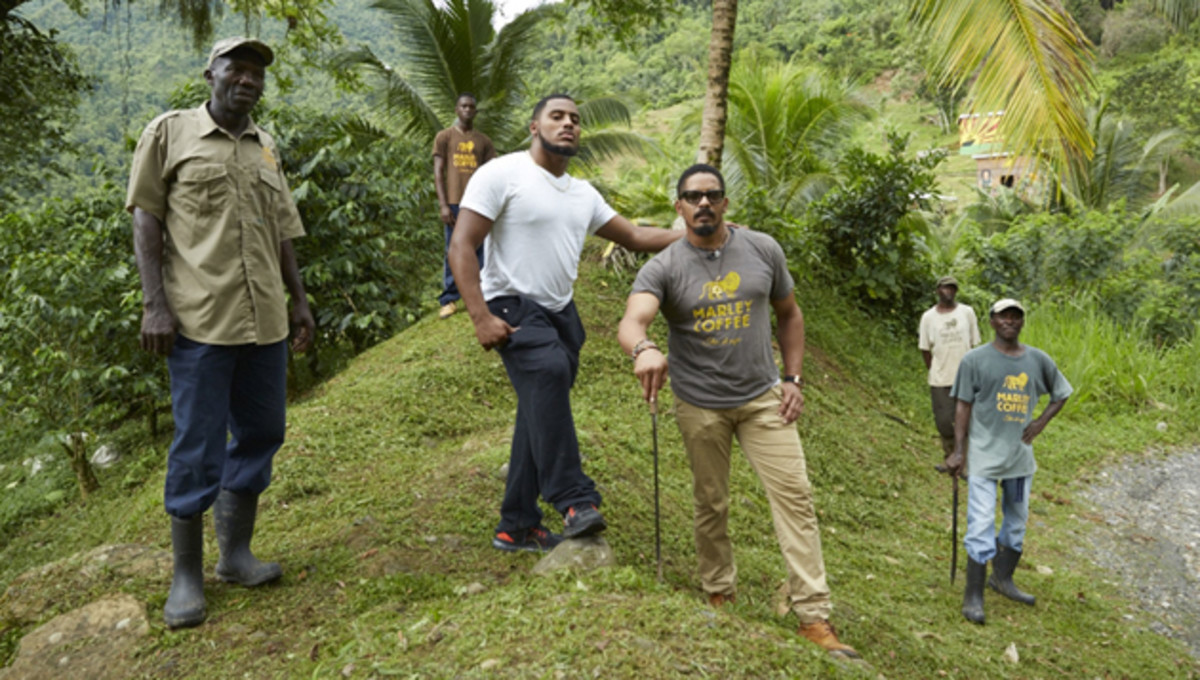
An impromptu family reunion takes shape. Everyone piles into three cars and heads to Hellshire Beach, one of the few places where Rohan’s dad still flickers in his memory. Bob would run with his children there, but it was not a jog. Everything was a race with him, and the slightly built rock star never once let Ziggy or Cedella or Stephen or Rohan or anyone else beat him.
It’s clear that the swimmers recognize Rohan and his brother Julian, 39, yet another Grammy-nominated Marley recording artist. The Marleys smile and splash and juggle a soccer ball with the other beachgoers, but they are not asked to pose for photographs. That’s not because of a security team or because people are afraid to ask, but “because they’re used to seeing us here,” Rohan says. “We grew up here.”
In one of the meager huts along the shoreline, lobsters and snapper that were drifting around swimmers’ ankles that morning are laid on a table and quickly devoured by the Marley clan, who wipe up the spicy remains with festival (sweet fried bread). Bali Vaswani, president of Marley Coffee’s Jamaican operations and a longtime family friend, often serves as the silk to Rohan’s sandpaper. He checks his phone and updates his boss about a developing retail opportunity in Korea.
Rohan’s success didn’t happen overnight. More like 10 years. Among the complications was the vague Rastafarian edict about abstaining from caffeine, but during a 2007 pilgrimage to -Ethiopia -- the cradle of the arabica bean, a place where his dad’s music seemed to play -constantly -- Rohan saw clearly that he was walking the right path. He is constantly traveling, so get-togethers like this one with his sons are rare. The boys are not practicing Rastafarians, but they know enough about the faith for all three of them to look toward the sky after each premeal prayer and to blend amiably with the people around them at Hellshire, who make as much in a month as the cost of the iPhone that Joshua dropped in the sand.
A film crew from Sports -Illustrated accompanies the clan to Trench Town, where the security of the equipment van is questioned. Rohan bristles -- “What you mean somebody have to watch the van?” he asks -- because it’s insulting to the people of Trench Town. Those people are underdogs too, his glare says.
*****
Nico Marley runs up behind his football coach, claps headphones over the 52-year-old man’s ears and says, “Listen to this!” -- surprising- Johnson not with modern trap music but with songs from Johnson’s own childhood, immediately improving his day. “Here’s what they do that’s so impressive to me,” Johnson says of Rohan and Nico. “They have a serious side -- dead serious -- but I don’t think they’ve ever had a bad day. They don’t think they’ve ever had a bad day.”

How would Bob Marley feel about his grandson’s playing on a team whose first string has as many white guys on it as black guys, a team where everyone is given a shot and size is insignificant? (Beginning with Nico, Tulane’s starting linebackers go 5' 9", 5' 10" and 5' 11".) A team that had the most takeaways (and, ahem, the most penalties) of any team in Conference USA last year? A group that plays in New Orleans, whose harbor imported more slaves than any other in the U.S., with a culture where amalgamation is the rule?
You’ll forgive Rohan, who went to every one of his son’s home games last fall, if he says that the whole picture reminds him of the song “War,” whose lyrics are an almost verbatim transcription of the speech the late Ethiopian emperor Haile Selassie, revered among Rastafarians, delivered to the U.N. in 1963:
Until there are no longer
First-class and second-class citizens of any nation;
Until the color of a man’s skin
Is of no more significance than the color of his eyes:
Me say war.
*****
For Curtis Johnson, taking what had been a 2–10 team in 2012 to the New Orleans Bowl last year, even though they lost to Louisiana-Lafayette 24–21, felt the same as it felt for Rohan to push the last branch aside and lay eyes on the waterfall whose sound had lured him deeper into the property where he would find his life’s work. It is part of the Spanish River, this waterfall he now “owns,” and it runs clear and relentless, formed by house-sized boulders of metamorphic rock left here by long-dead volcanoes.
“I could see Nico getting a shot at the next level as a special teams player,” Johnson says, “but if that doesn’t work out for him, he’ll be a multimillionaire doing something. You don’t see aggressive, smart guys like him, with that kind of personality, very often.”
Bob Marley and Sports
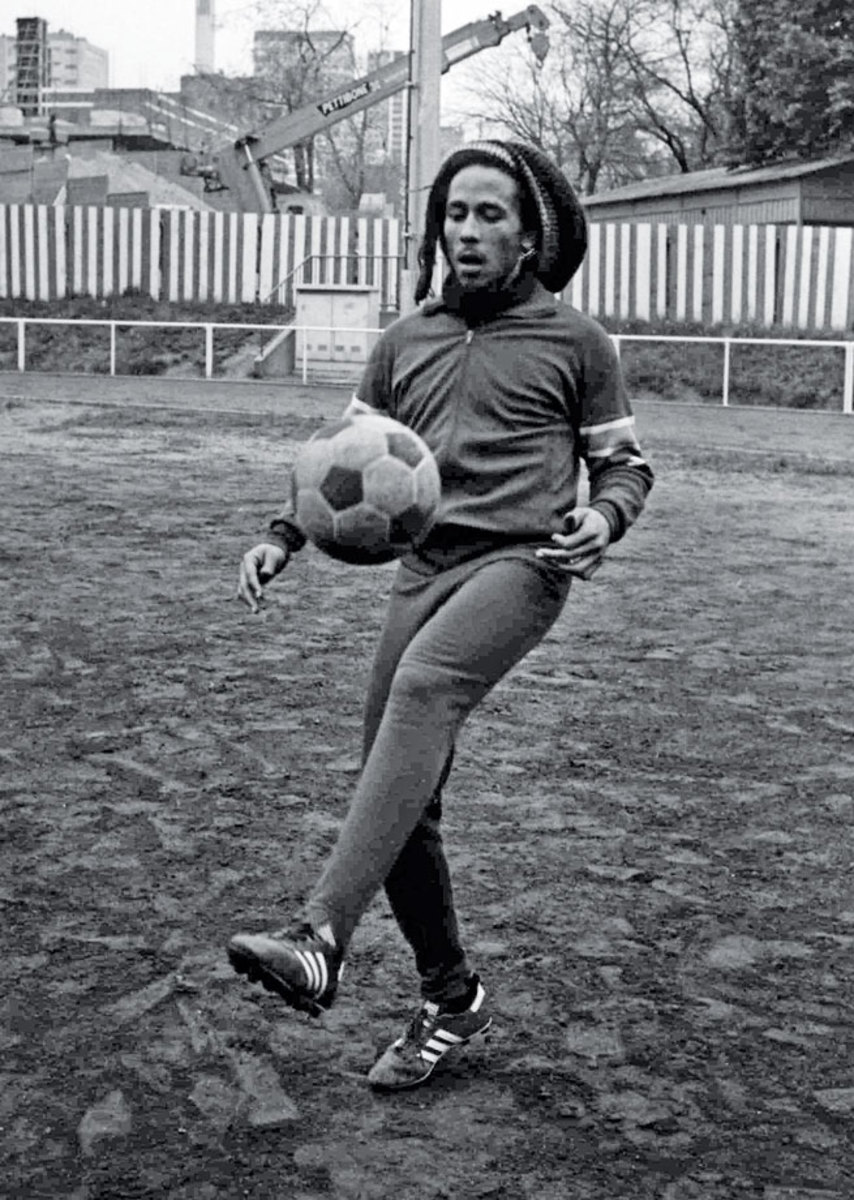
Bob Marley practices his soccer skills in Paris on May 10, 1977. Marley and friends were due to play in a friendly match against French personalities, but due to bad weather the match was cancelled.
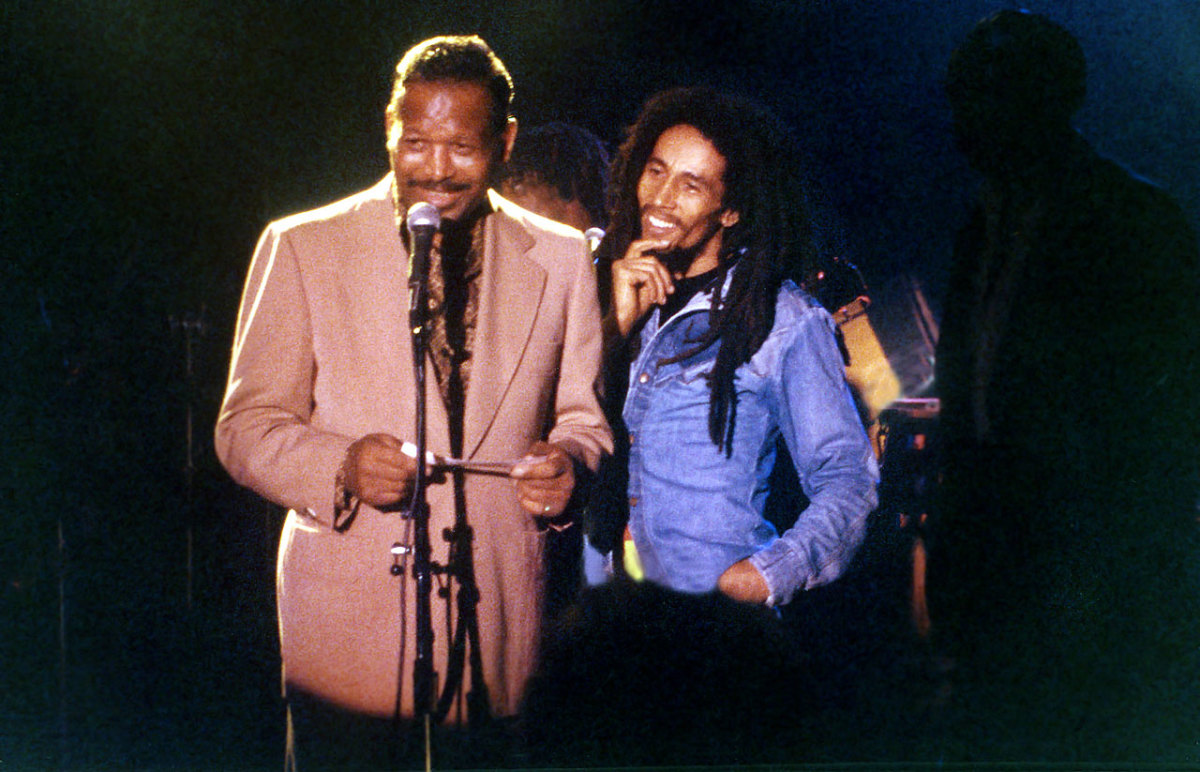
Bob Marley joins former Heavyweight Boxing Champion Sugar Ray Robinson on stage during a benefit concert for the Sugar Ray Robinson Youth Foundation on Nov. 27, 1979, in West Hollywood, Calif.
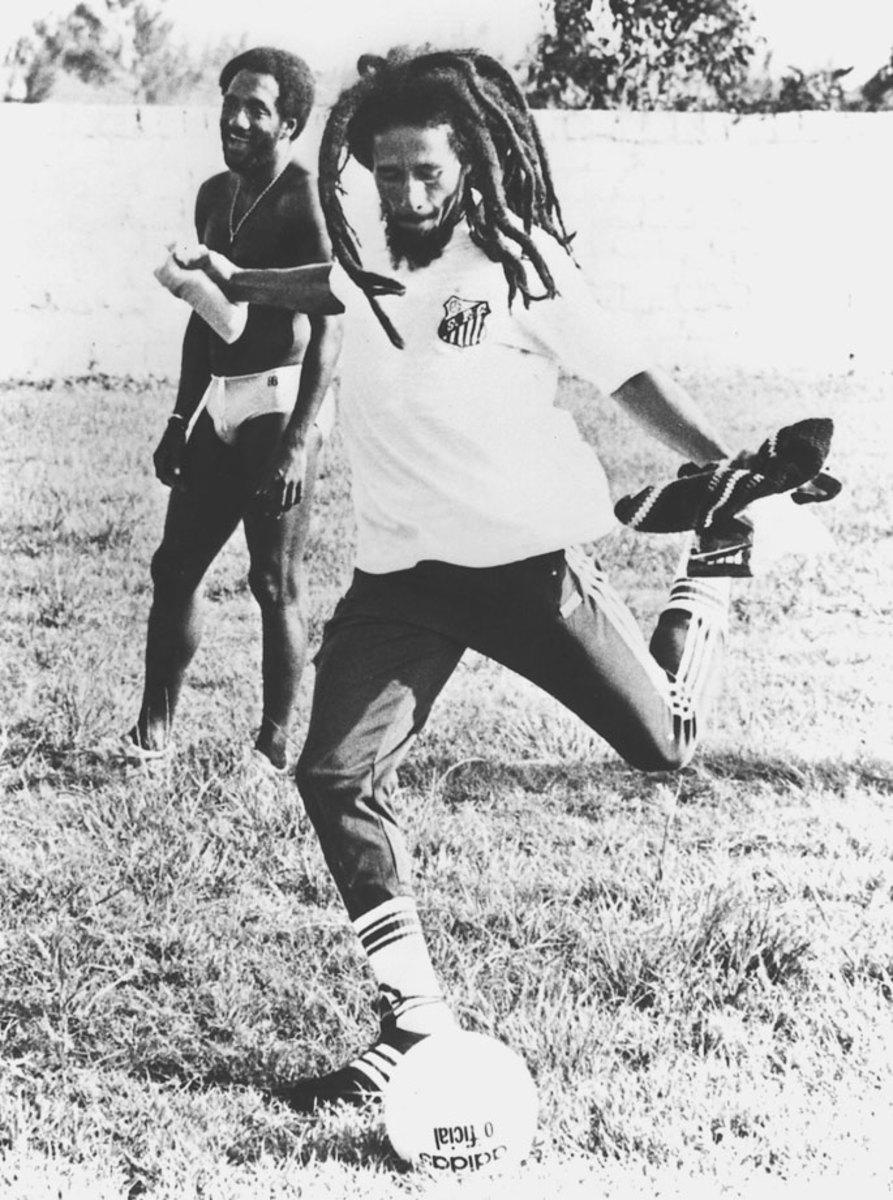
Bob Marley looks to kick a soccer ball as Brazil's Paulo Cezar Caju looks on in May 1980.
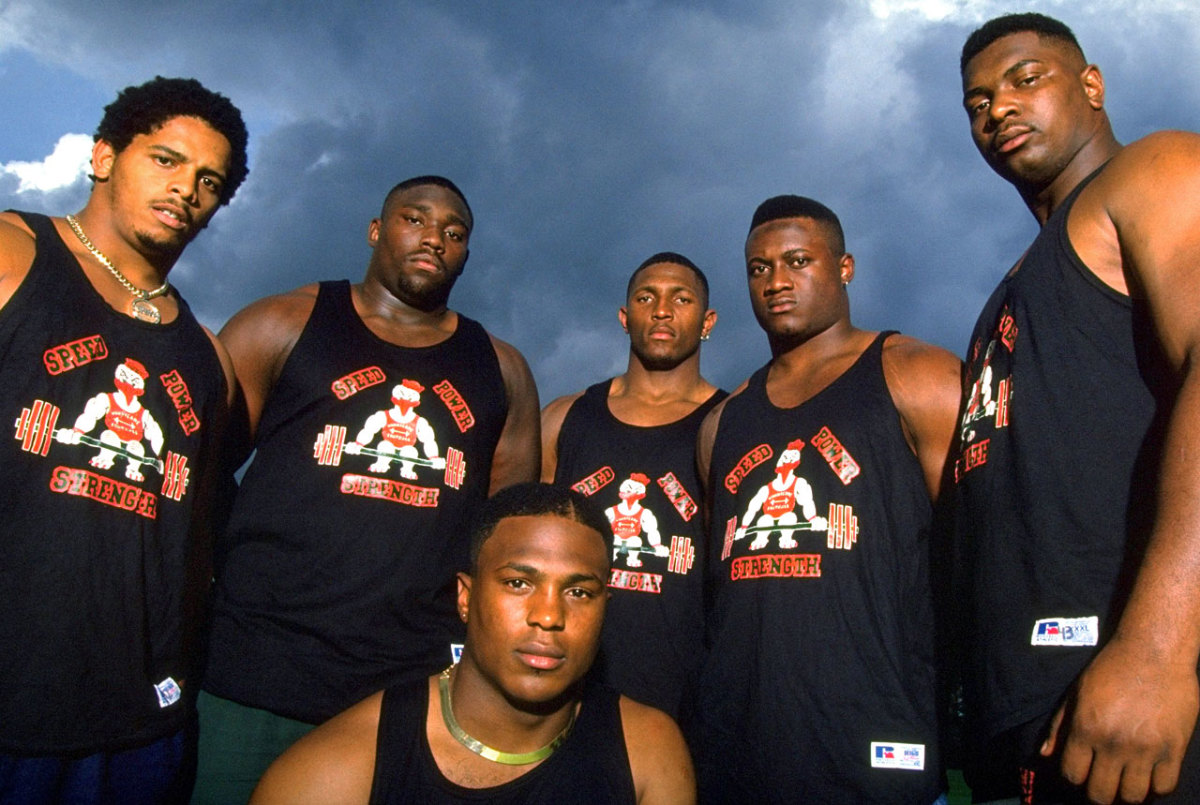
Miami Hurricane linebacker Rohan Marley (left), son of Bob Marley, poses with teammates (left to right) Warren Sapp, C.J. Richardson, Ray Lewis, Corwin Francis and Patrick Riley during an SI photo shoot in Miami on March 31, 1994.
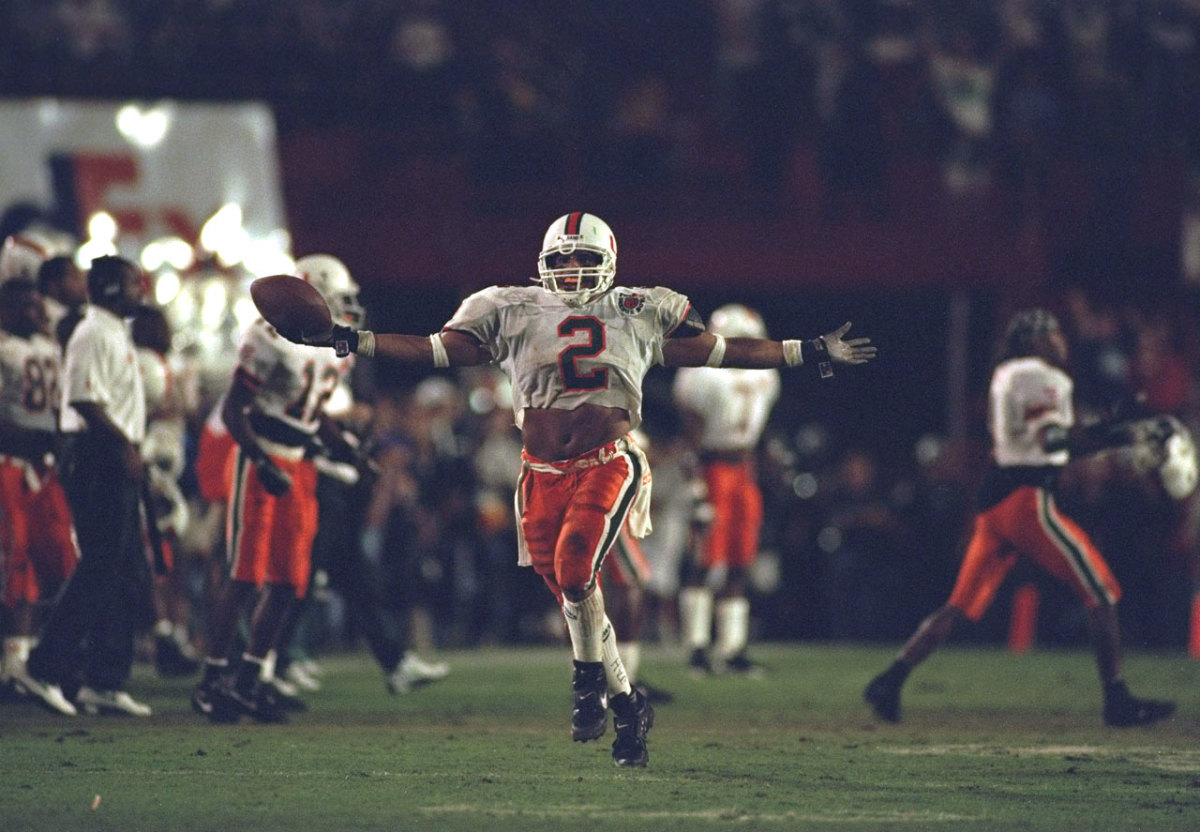
Rohan Marley celebrates a play during Miami's national championship game against Nebraska at the Orange Bowl on Jan. 1, 1995. The No. 1 ranked Cornhuskers defeated the No. 3 Hurricanes, however, 24-17.
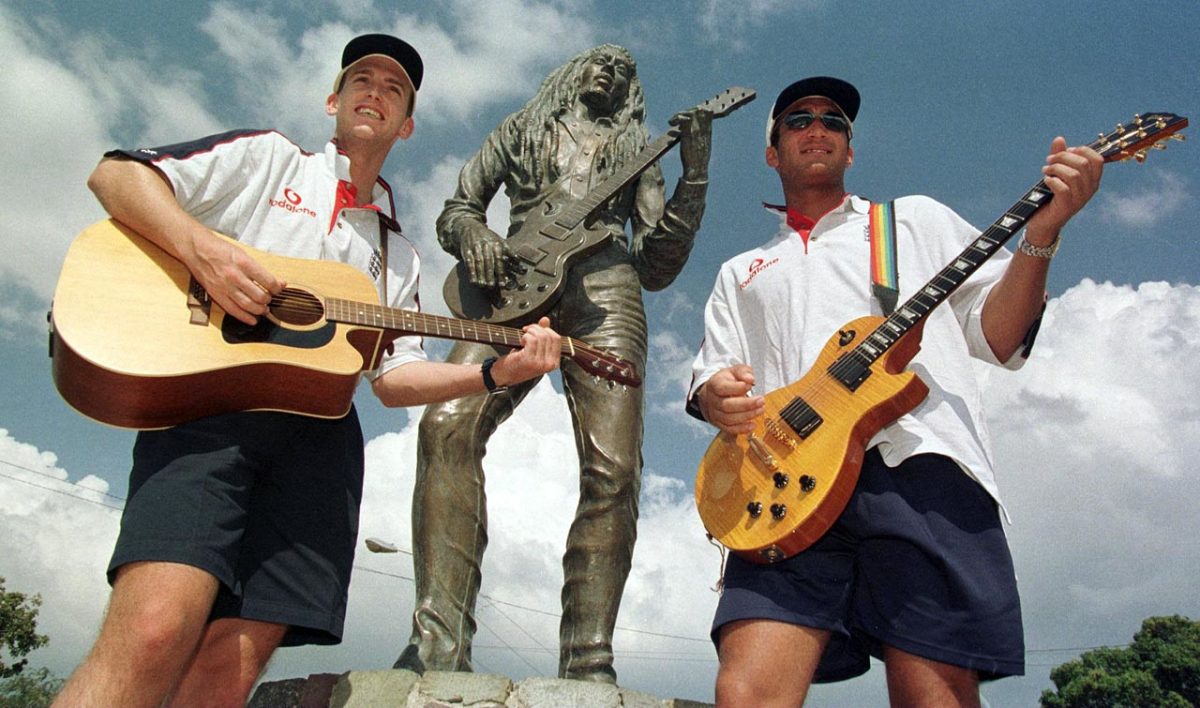
John Crawley and Mark Butcher of the England cricket team play guitar in front of the legendary Bob Marley statue in Kingston, Jamaica, on Jan. 13, 1998.
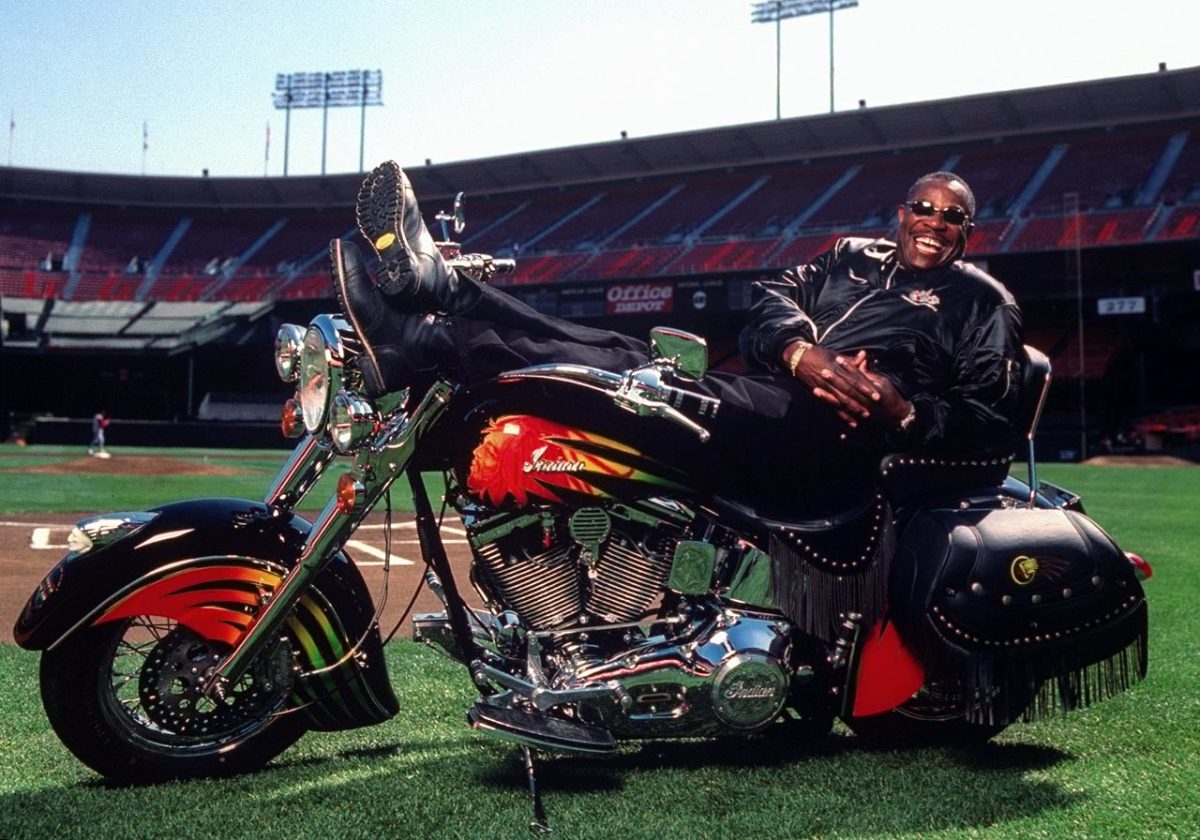
San Francisco Giants manager Dusty Baker laughs as he lies on his Harley Davidson motorcycle on the field at Candlestick Park in San Francisco on July 1, 1999. A caricature of Bob Marley appears on the gas tank.
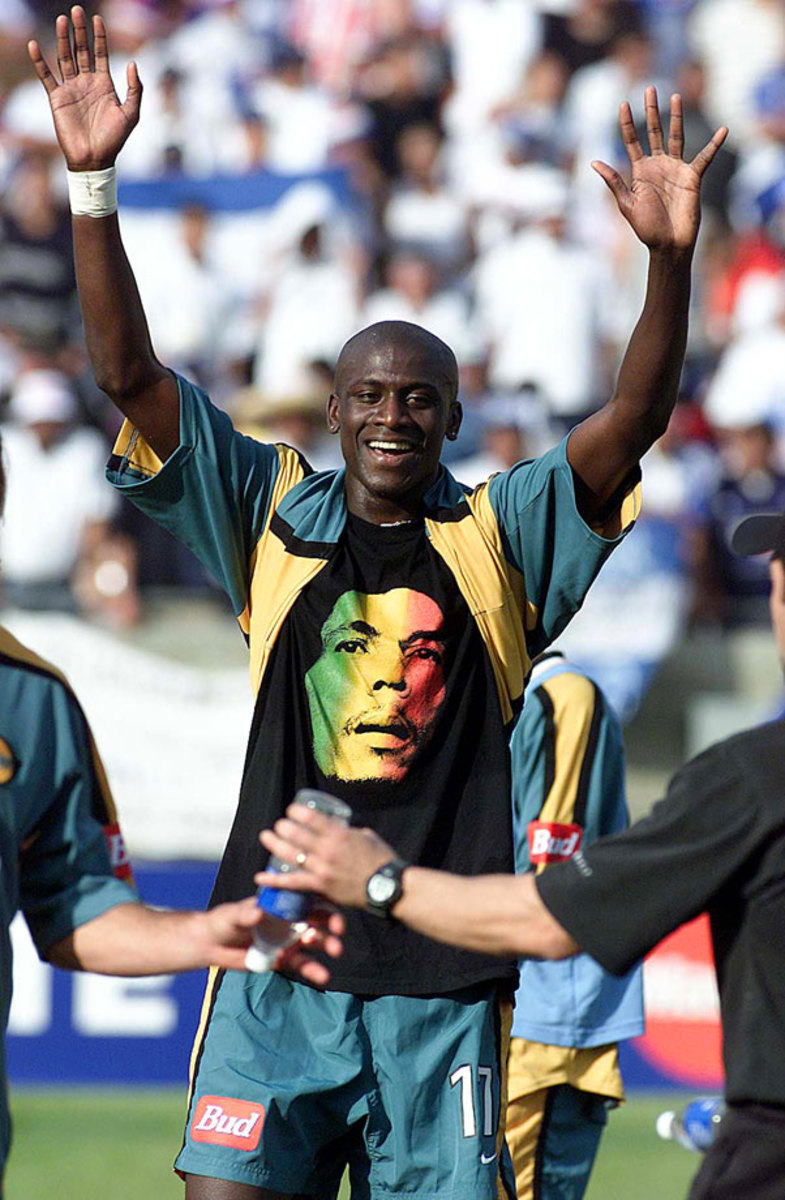
LA Galaxy midfielder Ezra Hendrickson shows off his Bob Marley t-shirt as he celebrates his team's 3-2 win over the Honduran squad CD Olimpia in the Champions Cup final in Los Angeles on Jan. 21, 2001. Hendrickson scored two of the Galaxy's three goals in the victory.
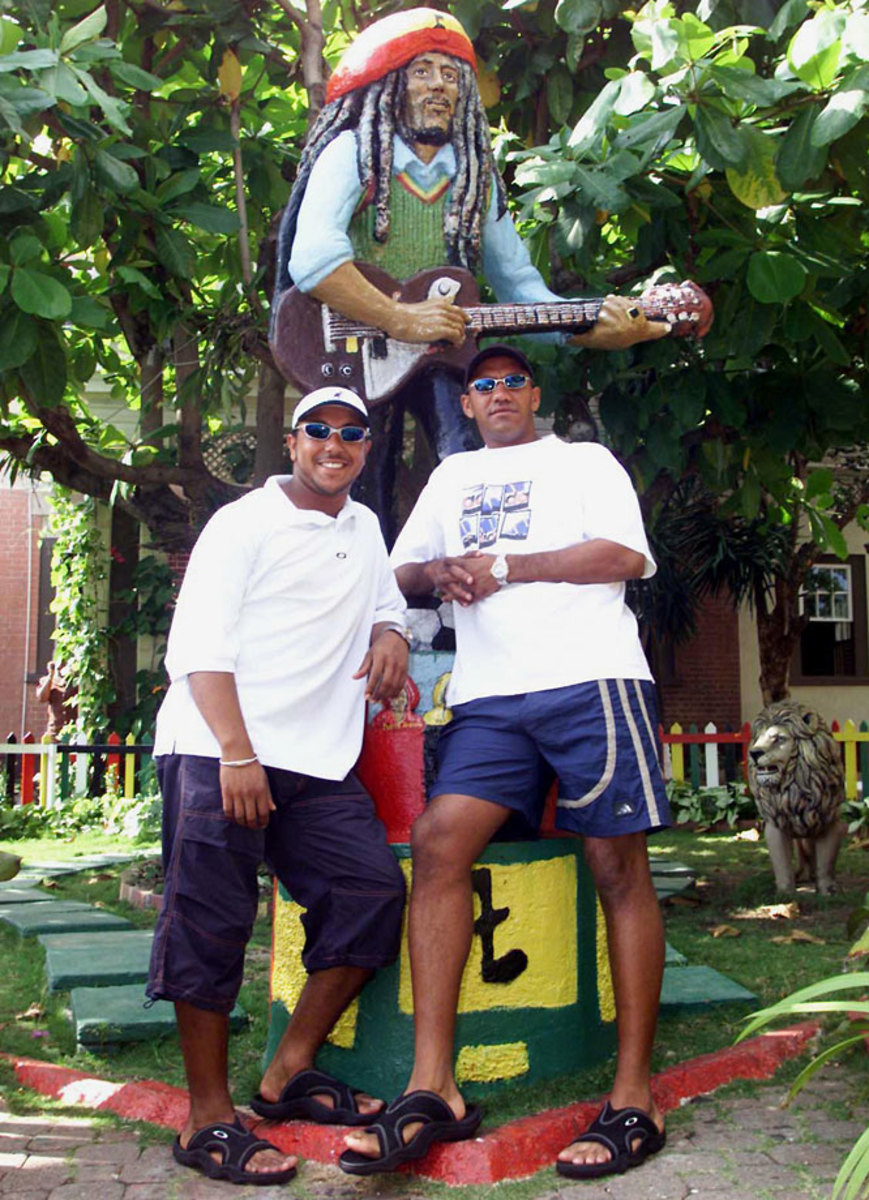
South African cricketers Paul Adams and Roger Telemachus pose outside the Bob Marley museum in Kingston, Jamaica, on April 26, 2001.
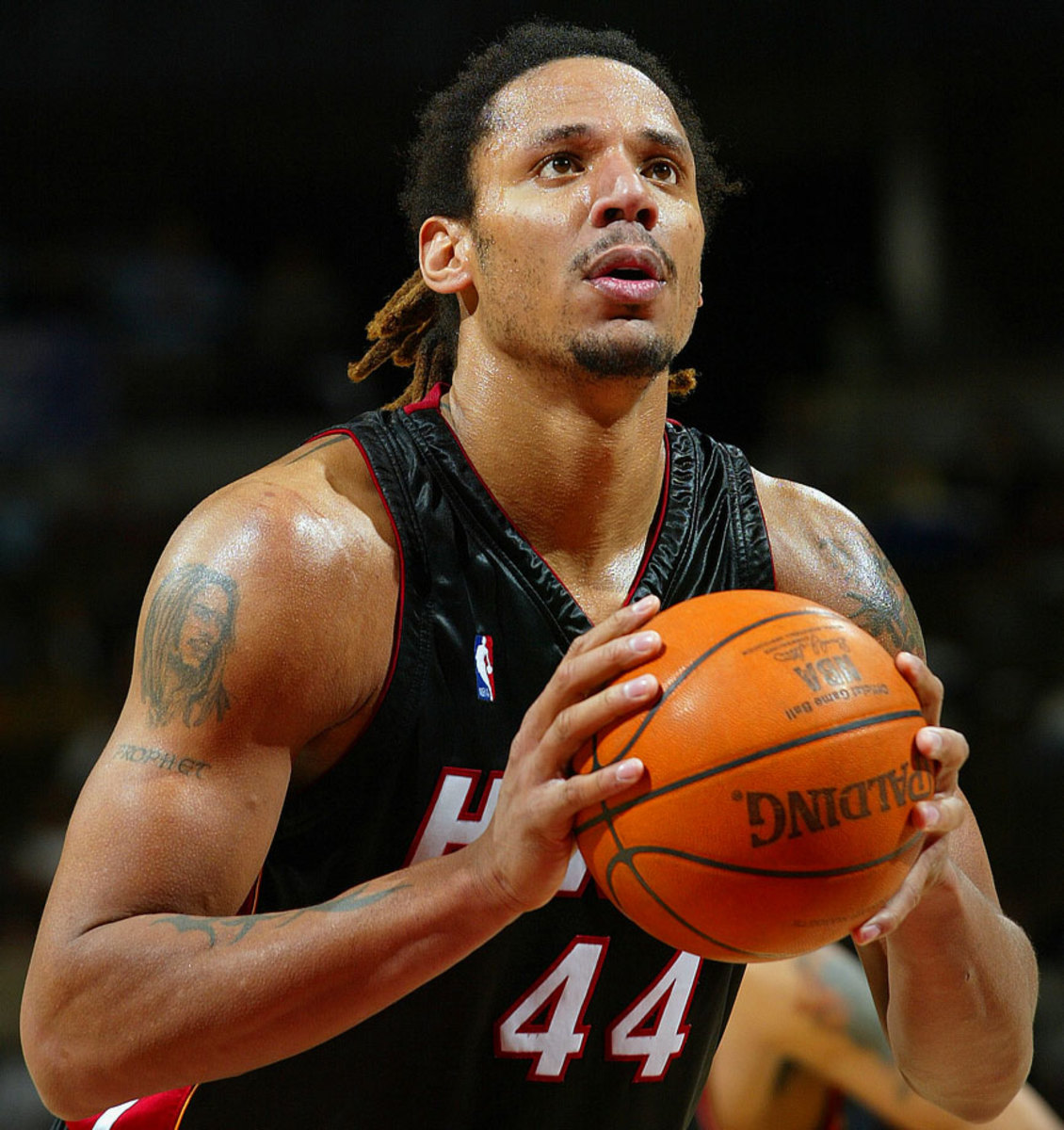
Miami Heat center Brian Grant, with a tattoo of Bob Marley on his arm, looks to shoot during a game against the Nuggets at the Pepsi Center in Denver on Jan. 8, 2003.
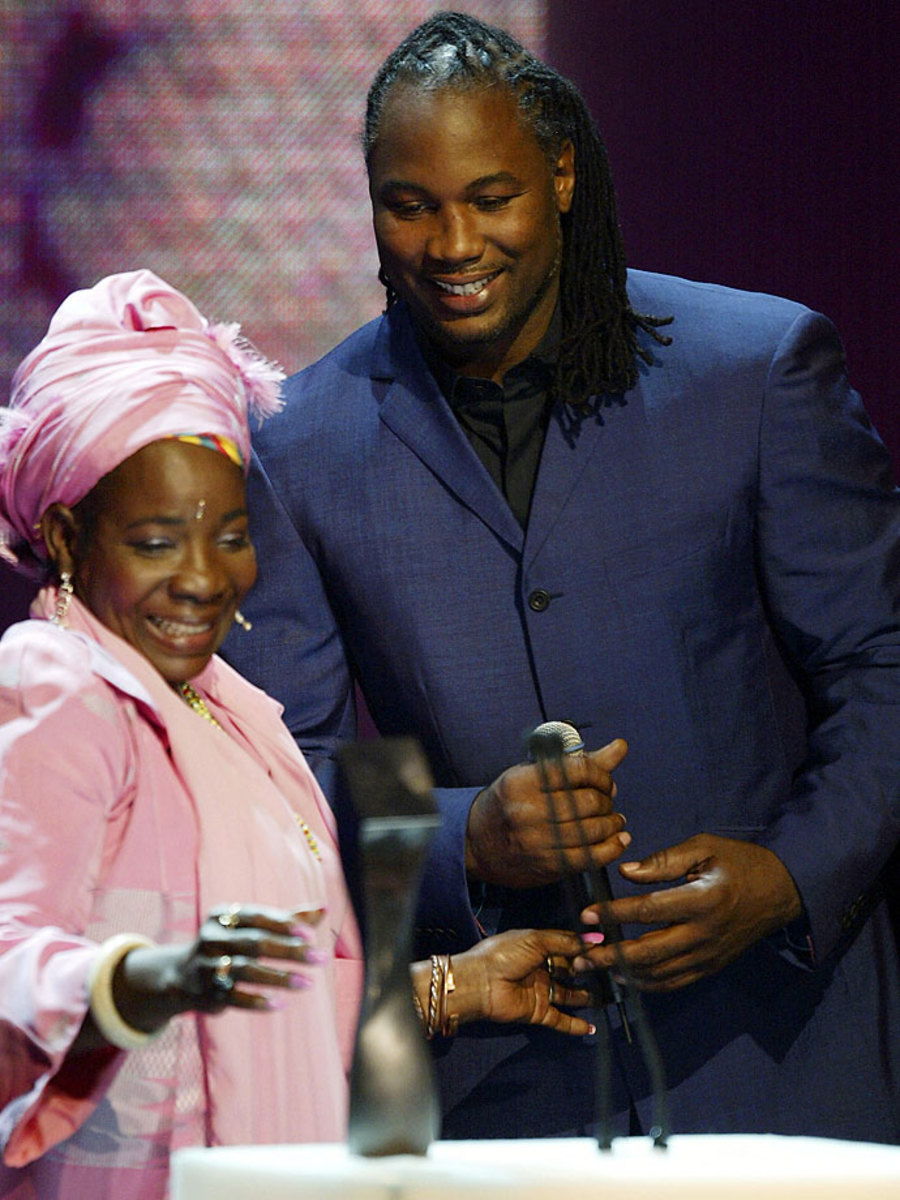
Boxer Lennox Lewis presents Bob Marley's widow Rita Marley an award for his Founding Member Induction at the UK Music Hall Of Fame in London on Nov. 11, 2004.
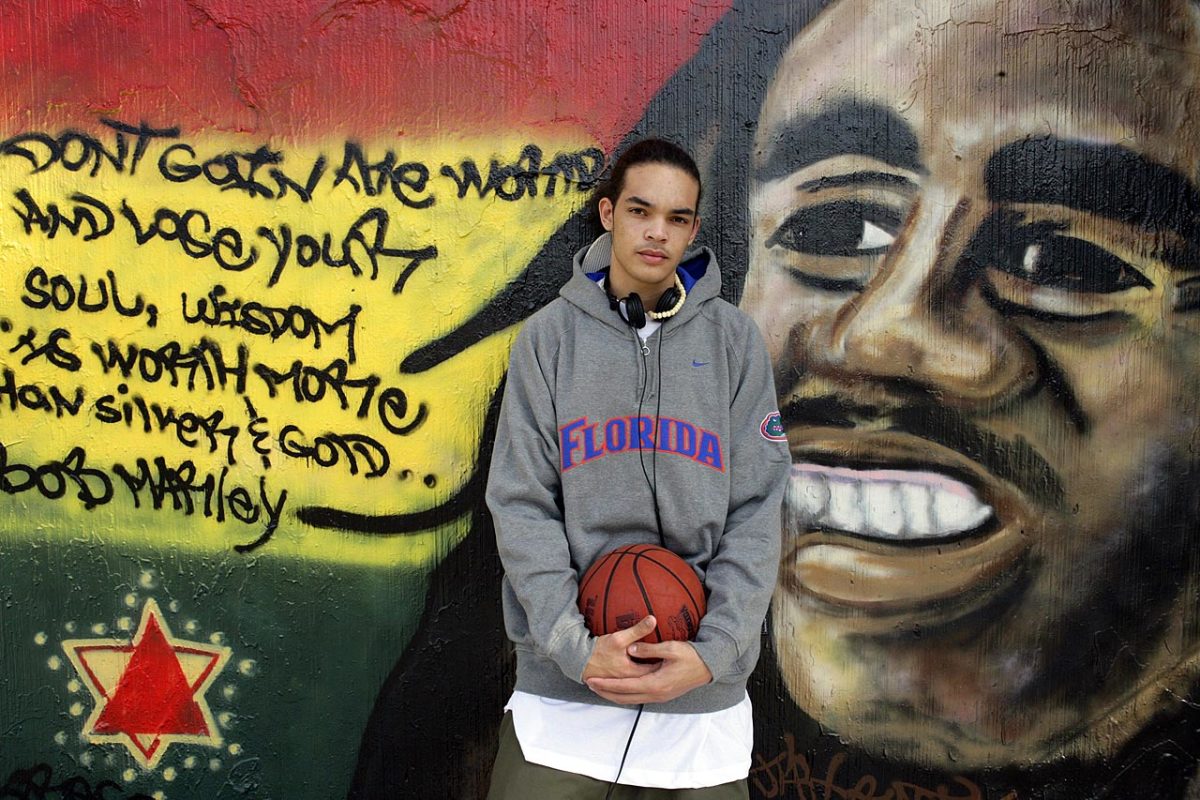
Florida Gators center Joakim Noah poses in front of a Bob Marley mural in Gainesville, Fla., on Jan. 12, 2006.
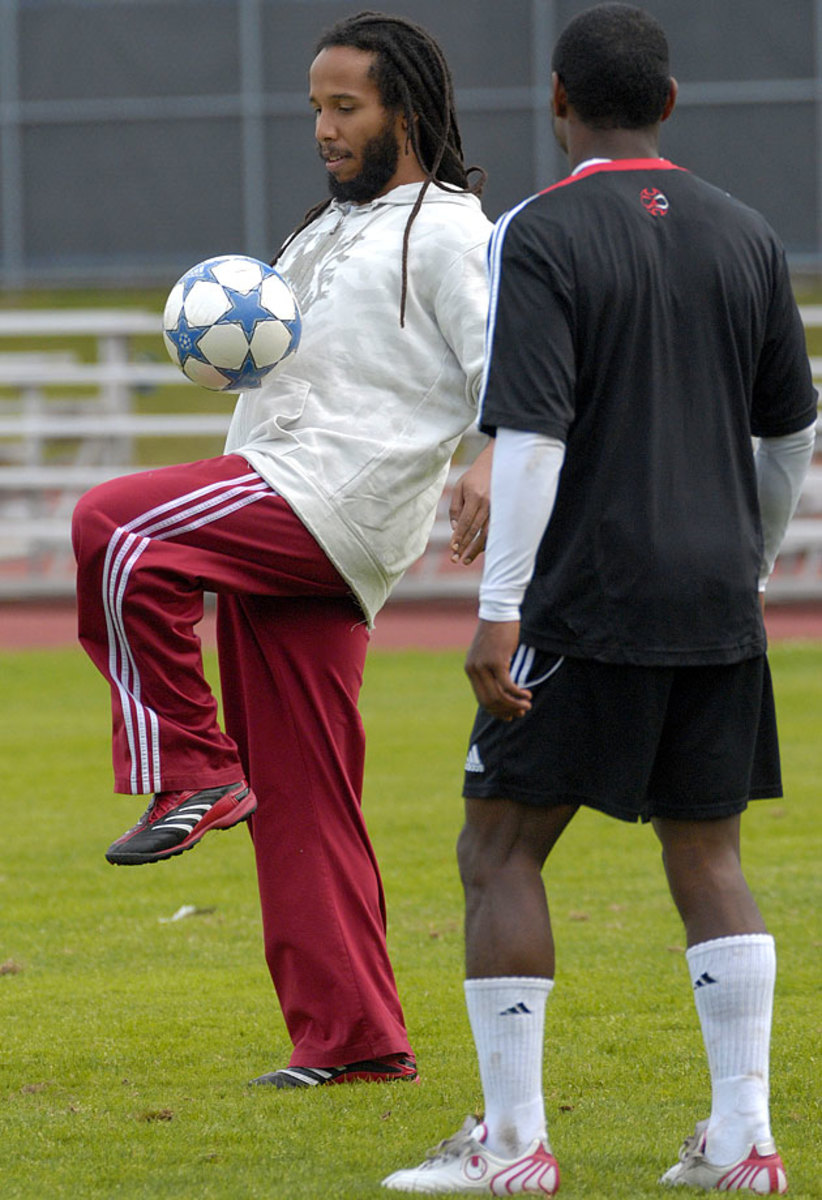
Bob Marley's son Ziggy Marley scrimmages with members of the Canadian national soccer team in Montreal on Sept. 2, 2006, two days prior to Canada's game with Jamaica.
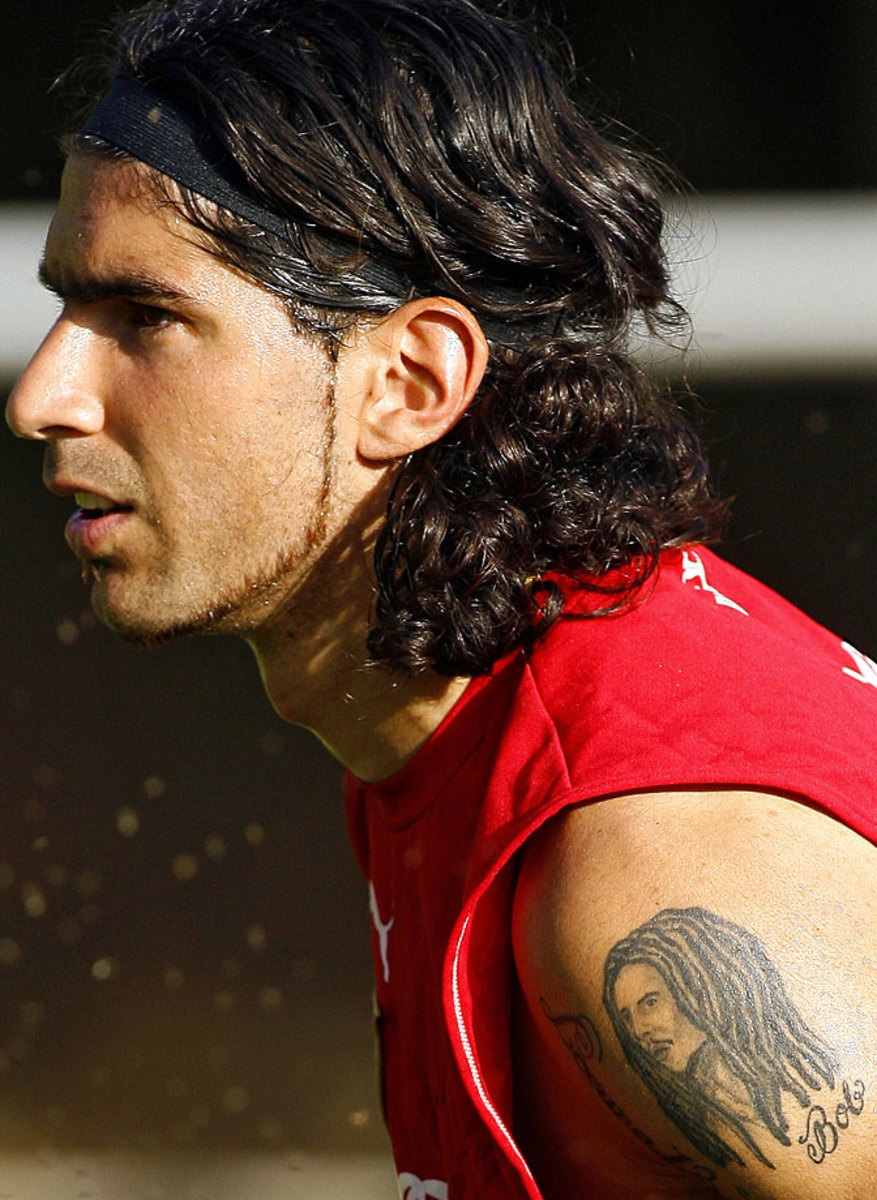
Uruguayan footballer Sebastian Abreu, with a tattoo of Bob Marley on his arm, takes part in a training session in Caracas, Venezuela, on July 12, 2007.
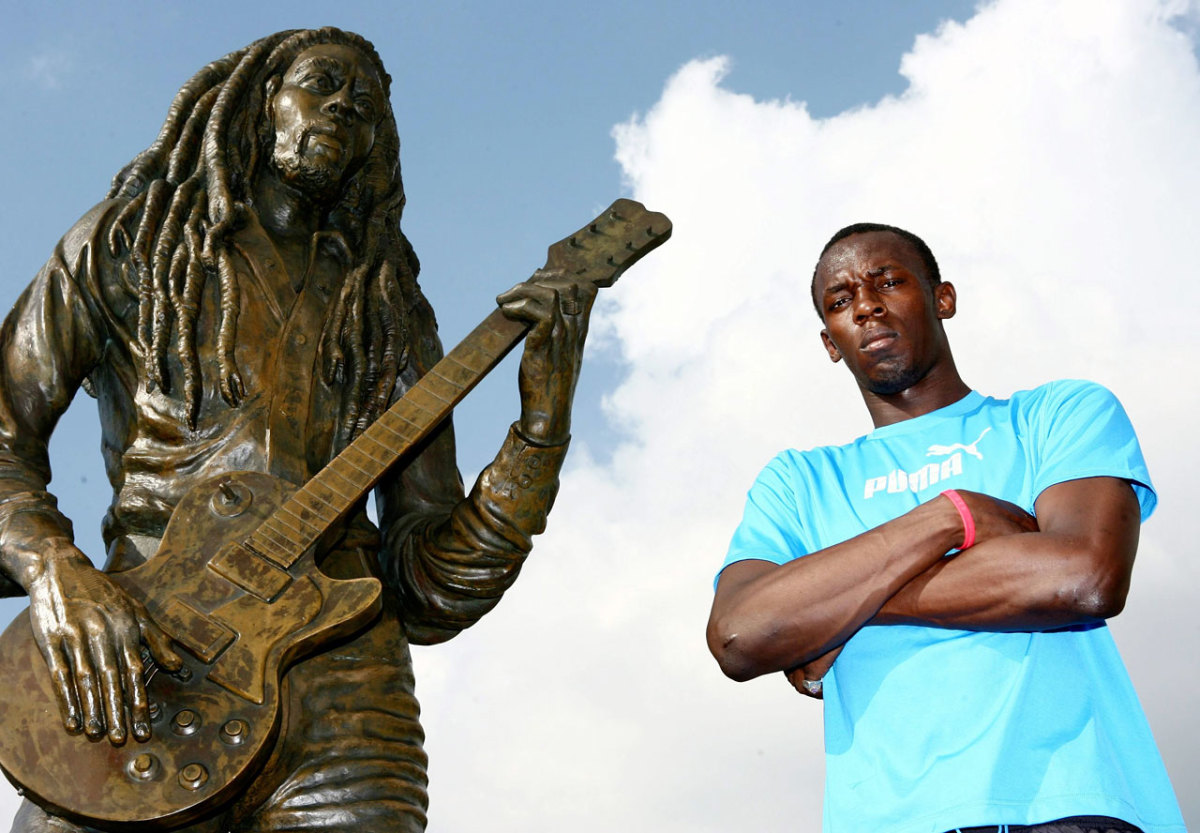
Usain Bolt poses next to the legendary Bob Marley statue in Kingston, Jamaica, on Oct. 19, 2007.
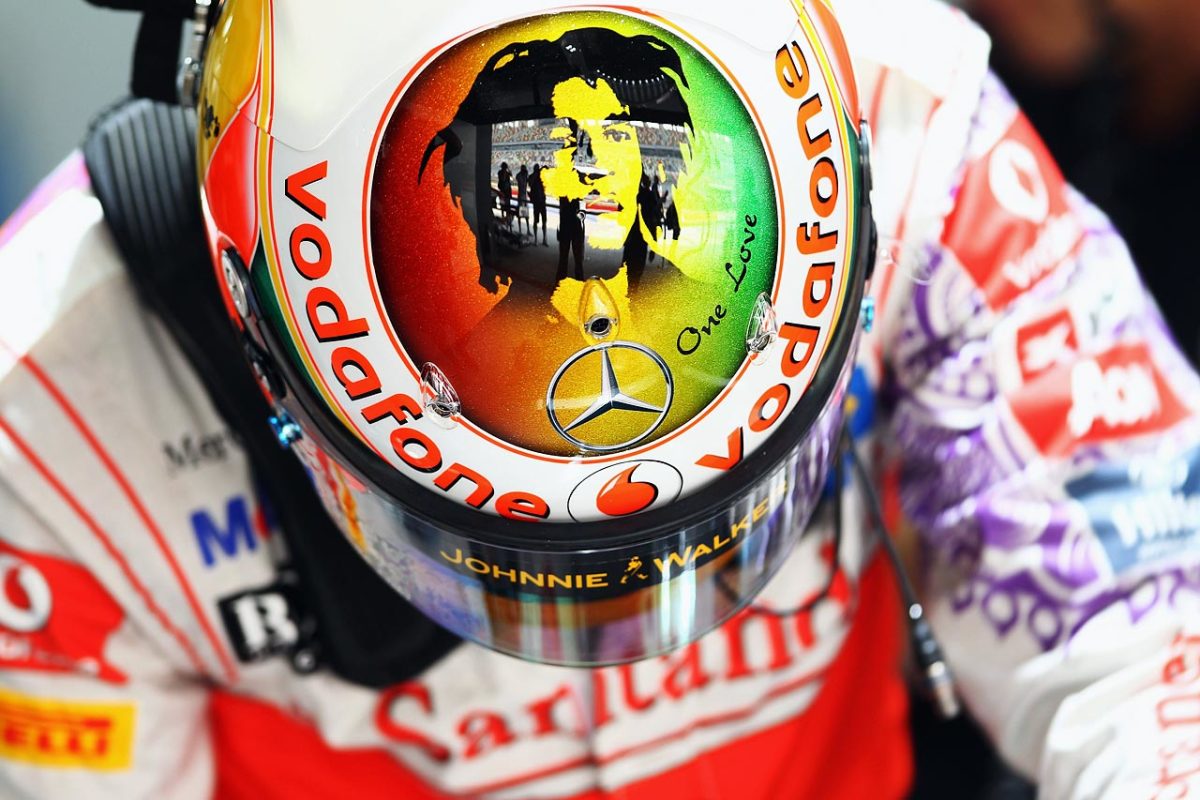
Lewis Hamilton wears a specially designed helmet with a tribute to Bob Marley as he prepares to drive during the final practice session prior to qualifying for the Indian Formula One Grand Prix at the Buddh International Circuit on Oct. 29, 2011 in Noida, India.
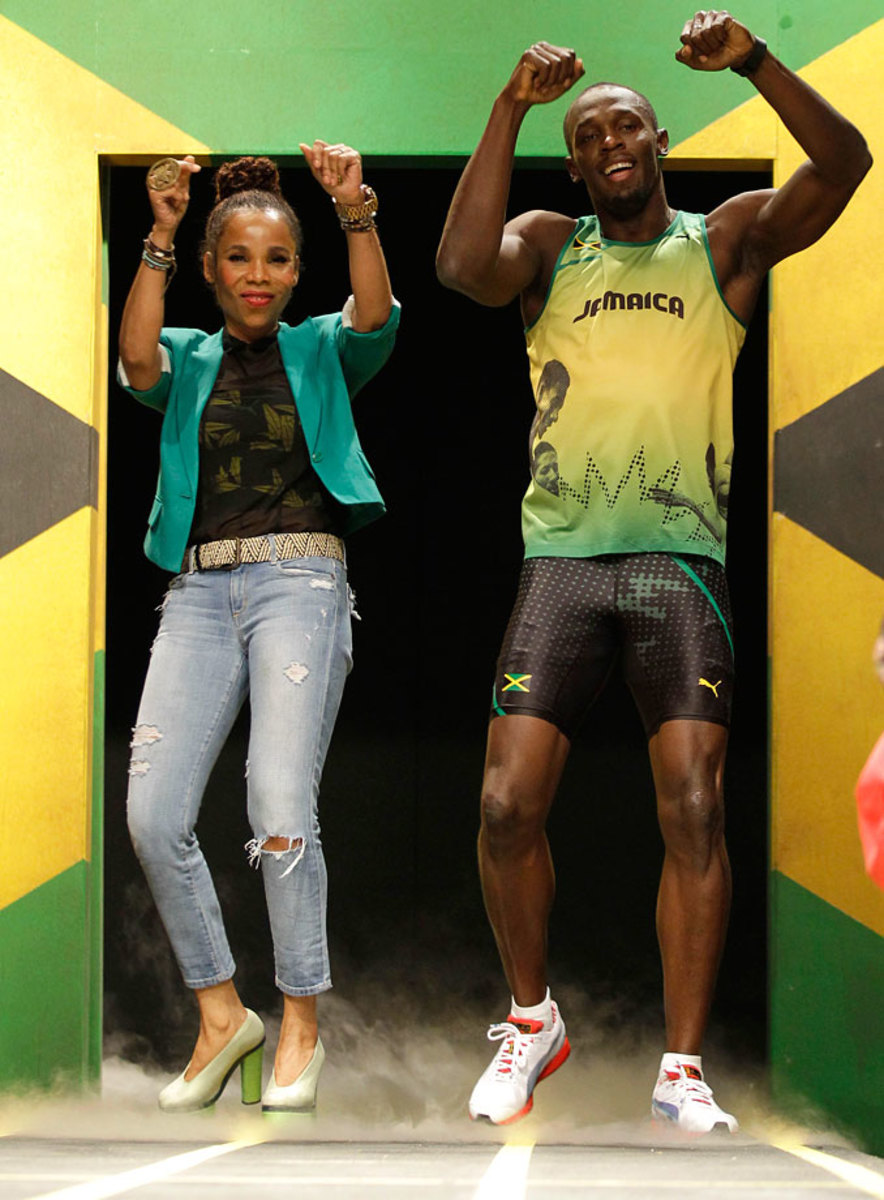
Usain Bolt models the Jamaican Olympic kit with designer Cedella Marley, daughter of Bob Marley, during the kit unveiling in London on June 1, 2012.
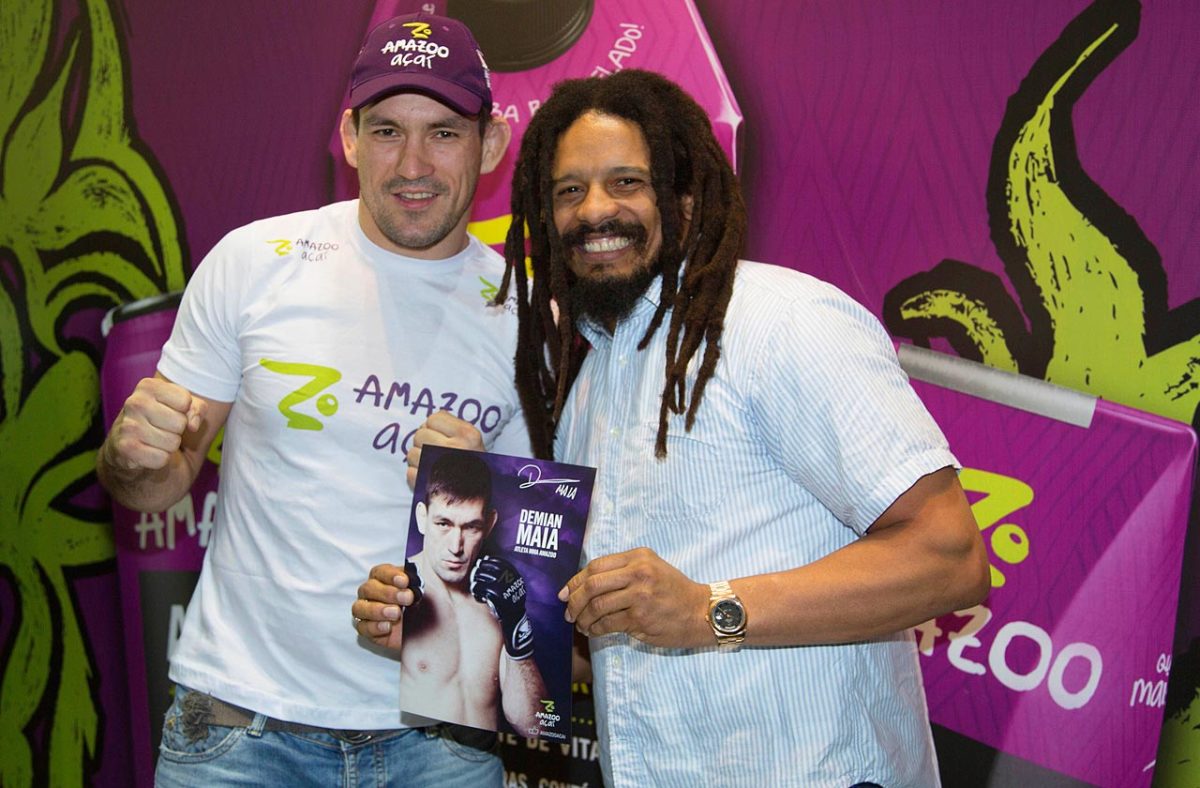
Rohan Marley and UFC fighter Demian Maia pose together at the Apas GlobalBev 2013 at Expo Center Norte on May 9, 2013 in Sao Paulo, Brazil.
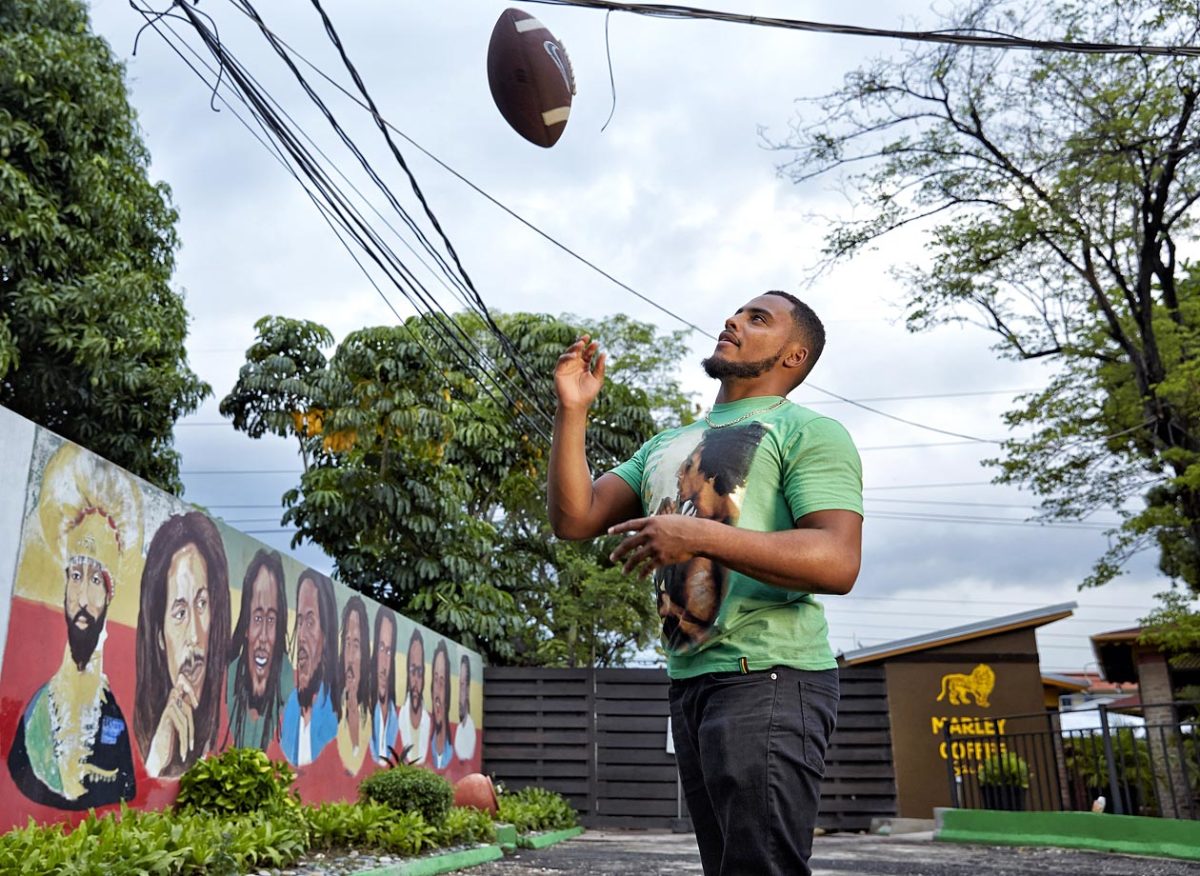
Tulane linebacker Nico Marley, grandson of Bob Marley, tosses a football during an SI photo shoot at the Bob Marley Museum in Kingston, Jamaica, on May 16, 2014.
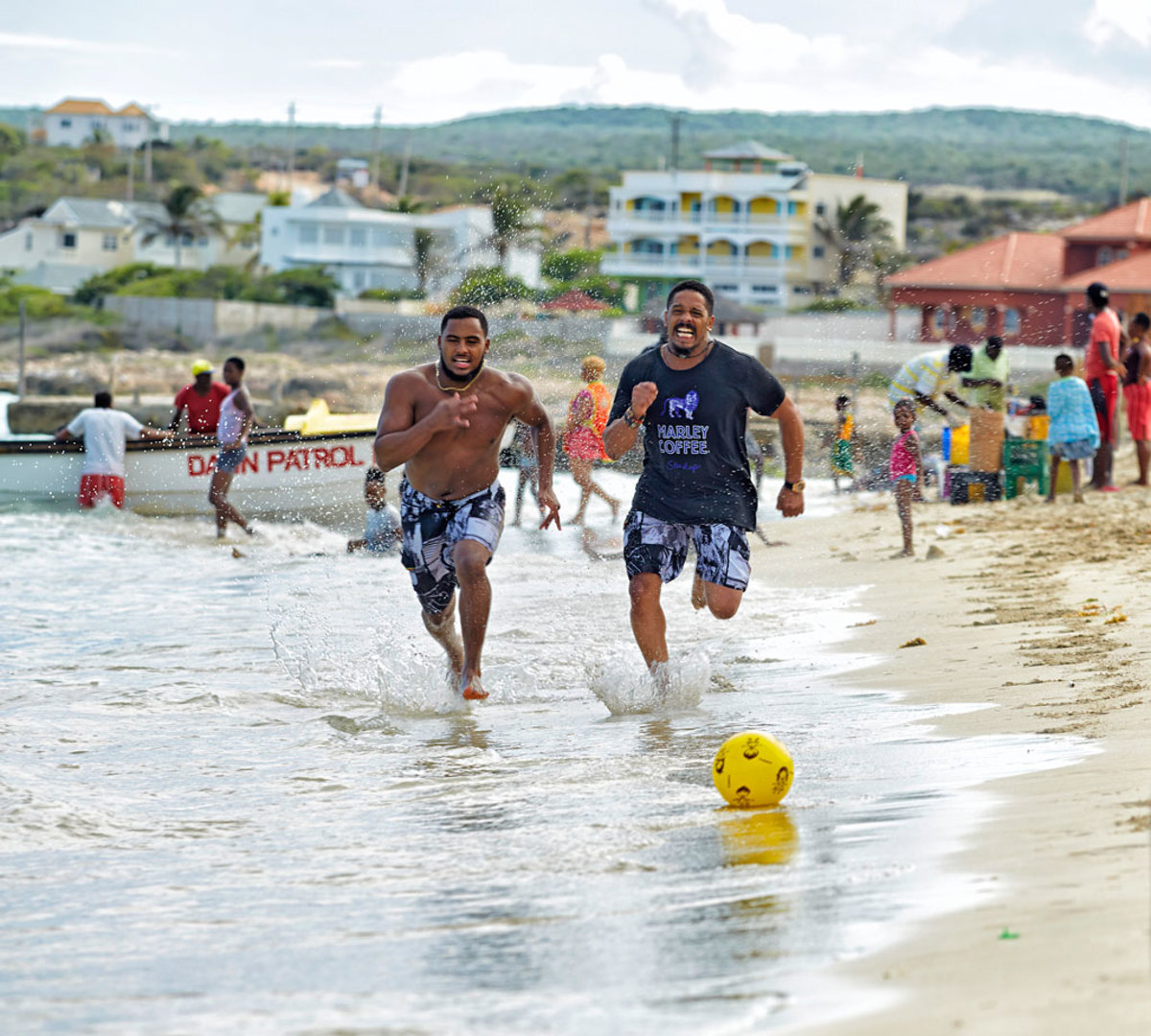
Nico Marley races his dad Rohan Marley along Hellshire Beach in Jamaica on May 16, 2014.
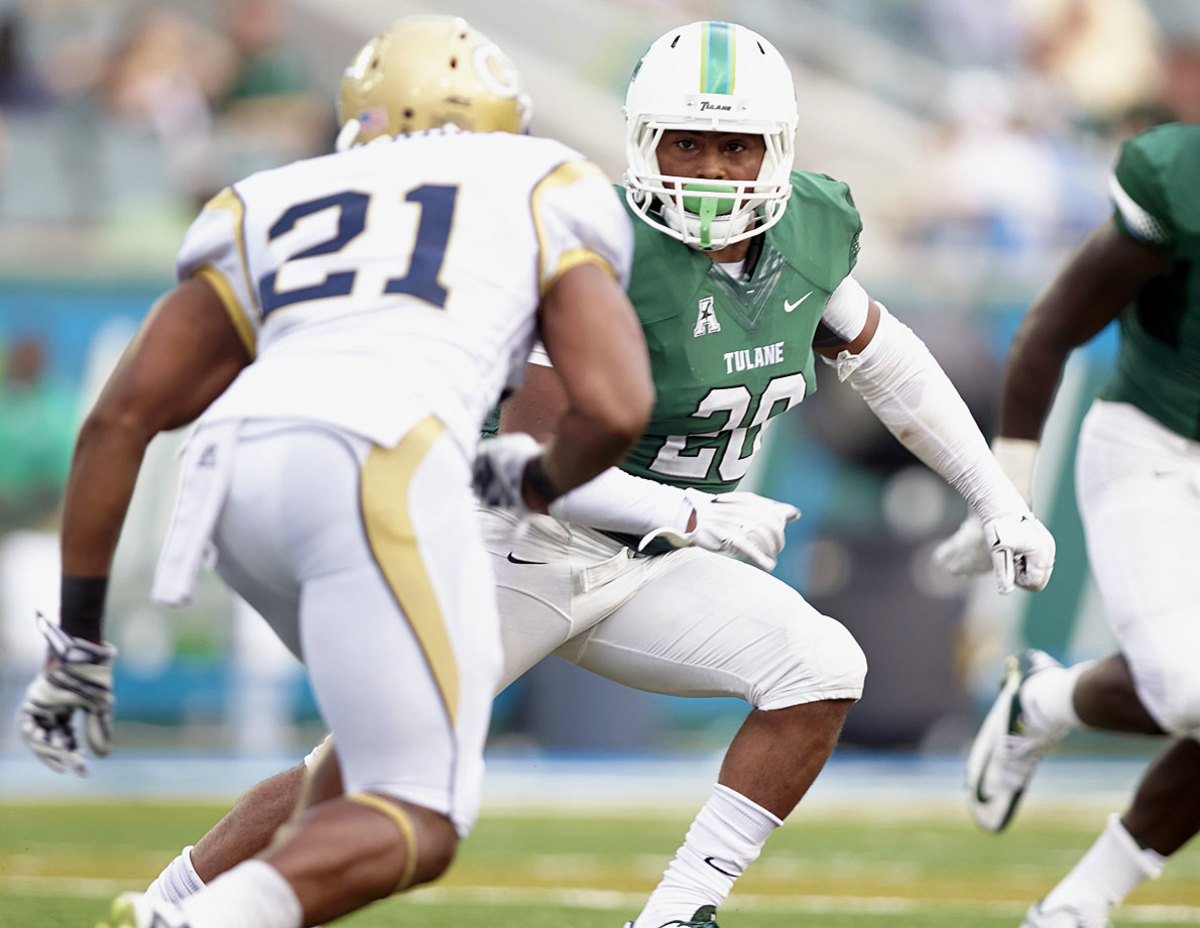
Tulane linebacker Nico Marley in action against Georgia Tech at Yulman Stadium in New Orleans on Sept. 6, 2014.
“I always wanted to make something for myself,” Nico says. “I’ve never said, ‘I’m gonna do it like my dad did it,’ or ‘I want to be like my grandfather.’ Every individual is supposed to have something he wants to go get, something he wants so bad he don’t need anybody’s help. That’s what I get from my father and grandfather.”
“No one has handed Nico anyt’ing in life,” says Warren Marley. “That’s Rohan’s way. Just like no one gave Ro anyt’ing.”
While we’re hypothesizing, what would Bob think if he could see his nephew, his son and his grandson -- their skins ranging from white to bronze to brown -- standing on former slave land raising ceramic cups to toast the thriving, earth-friendly business that bears his name, the youngest among them attending one of America’s finest colleges on an athletic scholarship?
For this, Brenton needs just two whistles: “Him would smile and say, ‘Good.’ ”
